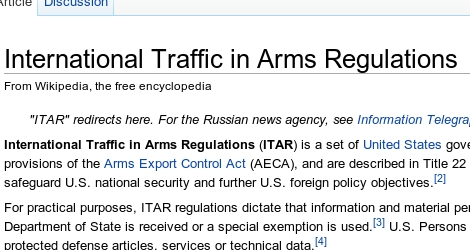
From time to time we consider the ramifications of hacking prowess being used for evil purposes. Knowledge is a powerful thing, but alone it is not a dangerous thing. Malicious intent is what takes a clever project and turns it to a tragic end. Conscientious hackers realize this, and [George Hadley] is one of them. While working on a new project he wondered if there were guidelines as to what knowledge should and should not be shared. It turns out that the United States has a set of International Traffic in Arms Regulations that mention concepts we’ve seen in many projects. He wrote up an article which covers the major points of the ITAR.
The gist of it is that sharing certain knowledge, by posting it on the Internet or otherwise, can be considered arms trafficking. It’ll get you a not-so-friendly visit from government officials and quite possibly a sponsored stay in a secure facility. Information about DIY radar, communications jamming, spying devices, UAVs, and a few other concepts are prohibited from being shared. The one qualifying part of that restriction is that it only applies if the information is not publicly known.










